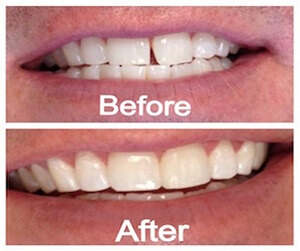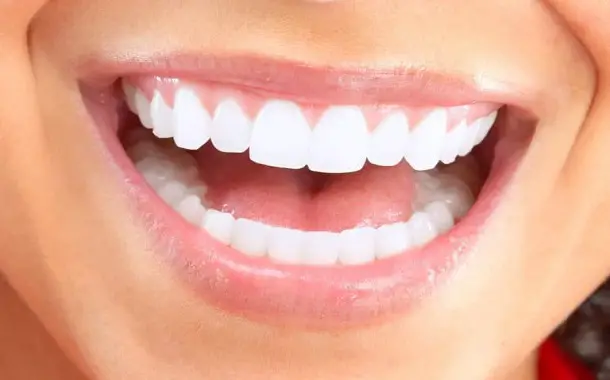How Much Does Dental Bonding Cost?
Last Updated on February 4, 2024
Written by CPA Alec Pow | Content Reviewed by ![]() CFA Alexander Popinker
CFA Alexander Popinker
Dental bonding can provide an affordable way to improve the appearance and structural integrity of your teeth and improve your overall oral health. But how much does the procedure actually cost? Here’s a detailed look at the factors that influence dental bonding prices and tips for keeping expenses low.
Bonding offers a budget-friendly alternative to other cosmetic treatments like veneers and crowns. This quick procedure involves applying a tooth-colored resin material to the surface of teeth to improve their appearance. Dentists also use bonding to repair chipped teeth, as well as cracked or discolored teeth.
How Much Does Dental Bonding Cost?
The average cost of dental bonding ranges from $100 to $600 per tooth. However, prices can vary quite a bit based on your specific needs and location.
Here are some examples of estimated bonding costs from dental clinics across the country:
- Austin, TX – $150-$350 per tooth
- Los Angeles, CA – $200-$500 per tooth
- Chicago, IL – $250-$600 per tooth
- New York City, NY – $300-$800 per tooth
Bayview Dental, for example, notes that dental bonding typically costs between $100 and $400 per tooth, with the price varying depending on the amount of work required. The procedure is considered more affordable than alternatives such as veneers, which can start at $1,000 and sometimes cost $2,000 or more.
According to Tolley Dental, the cost of dental bonding can range from $100 to $500 per tooth, depending on the number of teeth being bonded and the complexity of the work.
DentalPlans.com writes that the average cost of dental bonding for cosmetic purposes is between $300 and $600 per tooth, but prices can vary widely.
For example, the cost of bonding for a small chip in a front tooth may be $100-$150, with prices topping out at about $1,000 per tooth. Dental insurance plans may cover some of the cost of tooth bonding if it is needed as part of a medical treatment.
RealSelf.com reports that dental bonding will usually cost between $150 and $350 for one tooth, depending on the specifics of the case.
As you can see, prices tend to be higher in major metropolitan areas and on the coasts. The complexity of your particular dental situation will also impact the cost.
What Factors Influence Dental Bonding Prices?
Several factors come into play when determining the total price you’ll pay for this dental procedure:
The Extent of the Procedure
How much bonding you need directly correlates to the cost. If you only need a small amount to cover a minor chip on one tooth, you’ll be at the lower end of the price scale. More extensive bonding to reshape teeth, close gaps, or cover multiple teeth will cost more.
Geographic Location
As shown above, your city and state can significantly influence pricing. In general, expect to pay more for any dental services in major metro areas and coastal regions. Prices also tend to be higher when visiting large, high-end cosmetic dental practices.
Your Dentist’s Experience Level
Dentists with more specialized cosmetic training and years of bonding experience typically charge more. However, their expertise may also allow them to achieve better aesthetic results.
Does Dental Insurance Cover Bonding Procedures?
Since bonding primarily serves a cosmetic purpose, dental insurance usually doesn’t cover the cost. However, plans may provide coverage if the procedure addresses certain structural/functional dental issues like:
- Repairing chips or cracks from injury
- Filling cavities
- Replacing old metal fillings with tooth-colored resin
Any coverage will depend on your specific dental insurance plan. You’ll need to carefully review your benefits and consult your dentist to confirm details. Expect to pay out-of-pocket for purely cosmetic bonding procedures.
Dental Bonding Vs Other Cosmetic Dental Treatments
Veneers and dental crowns also improve tooth appearance but involve more intensive procedures. Here’s how the costs compare:
- Dental bonding – $100 to $600 per tooth
- Porcelain veneers – $925 to $2,500 per tooth
- Dental crowns – $500 to $3,000 per tooth
While more affordable, bonding generally only lasts 5-7 years compared to 10-15 years for veneers and crowns. The choice comes down to your specific aesthetic goals, budget, and how long you want results to last.
Financial Planning for Dental Bonding
 Since insurance doesn’t cover cosmetic procedures, you’ll need to budget and plan ahead if you want to get dental bonding done. Here are some tips:
Since insurance doesn’t cover cosmetic procedures, you’ll need to budget and plan ahead if you want to get dental bonding done. Here are some tips:
- Have an initial consultation to get an accurate cost estimate from your dentist.
- Ask if you can pay per tooth as the work is completed rather than paying everything upfront.
- Inquire about financing options like payment plans and medical credit cards.
- Consider setting aside a certain amount from each paycheck to put towards the procedure.
- Take advantage of dental schools/clinics that offer bonding at discounted rates performed by students and supervised by experienced dentists. Just keep in mind the process will take longer.
Finding Affordable Dental Bonding
You don’t have to break the bank to transform your smile with bonding. Here are some ways to save:
- Shop around for quotes – prices can vary dramatically between dentists.
- Choose a quality dentist in an area with a lower cost of living to avoid premium prices.
- Opt for minimal prep bonding that doesn’t require drilling or anesthesia to keep costs down.
- Ask your dentist about alternative materials like glass ionomers that may cost less than composite bonding.
- Consider dental tourism for big savings on dental care (but do your research to find a skilled and reputable dentist).
Conclusion
While dental bonding costs can range significantly based on your individual needs and provider, it remains one of the most budget-friendly cosmetic dentistry options. With proper planning and cost comparison, you can achieve the smile you want at a price you can afford.
Frequently Asked Questions
How long does bonding last on teeth?
Dental bonding can last 5-7 years on average with proper care. However, bonding longevity depends on several factors:
- Placement – Bonding on the front teeth tends to last longer than on the back teeth that bear more chewing pressure.
- Oral habits – Grinding or clenching can put more stress on dental bonding and decrease its lifespan.
- Dental hygiene – Poor brushing and flossing habits can lead to decay or damage at the bonding edges, requiring repair or replacement sooner.
- Avoiding damage – Being cautious with bonding to prevent cracks or chipping from trauma will help the restoration last longer.
- Check-ups – Regular dental visits allow your dentist to examine bonding and make small repairs if needed, avoiding larger replacements.
Following good oral hygiene and avoiding biting or chewing hard foods with bonding can maximize longevity. Inform your dentist at the first sign of deterioration to get prompt minor repairs. With proper maintenance, dental bonding can last 5 years or more before needing a replacement.
Is dental bonding worth it?
Dental bonding can absolutely be worth the investment for many patients. Benefits that make bonding a worthwhile cosmetic treatment include:
- Fast results – Bonding takes just one dental office visit with no anesthesia or drilling required. You walk out with an improved smile right away.
- Versatility – Dentists can use bonding to fix chips and cracks, close gaps, reshape teeth, cover stains, and more. It offers a variety of cosmetic and restorative uses.
- Affordability – Compared to other cosmetic treatments like veneers and crowns, bonding costs significantly less per tooth.
- Convenience – The bonding process is relatively quick and painless. You can even have touch-ups and repairs done quickly during routine dental visits.
- Conservative option – Unlike veneers or crowns, bonding doesn’t require removing substantial tooth structure. It’s a more conservative treatment.
As long as you understand that bonding generally lasts just 5-7 years, it can provide an excellent cosmetic dentistry option and value for the money. Talk to your dentist to decide if it’s right for your needs.
How much tooth is needed for bonding?
Dental bonding requires only minimal tooth structure preparation in most cases. Here’s how it works:
- The dentist roughens the outer enamel layer of the tooth slightly with a mild etching solution. This helps the bonding material adhere properly.
- They may gently reshape areas using a dental drill for a more ideal shape before bonding. However, significant tooth removal is rarely needed.
- The prepared surface just needs to be a few millimeters wide to allow bonding material to adhere adequately.
- If the natural tooth is already an ideal size and shape, the dentist may skip drilling or reshaping altogether.
- After applying bonding resin and curing it with a special light, the dentist carefully sculpts, shapes, and polishes it for a natural appearance.
The beauty of dental bonding is that it preserves much more natural tooth compared to veneers or crowns. Only a small roughened surface is needed to place the bonding material successfully. This minimal preparation helps maintain as much of your natural tooth structure as possible.



Leave a Reply
Want to join the discussion?Feel free to contribute!